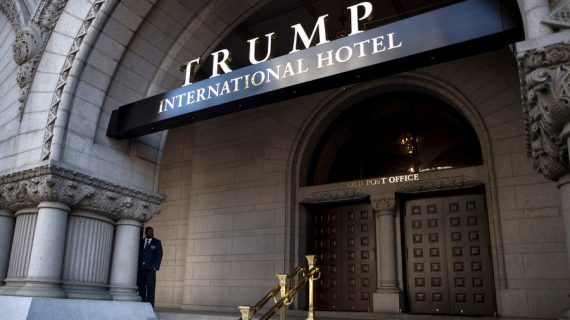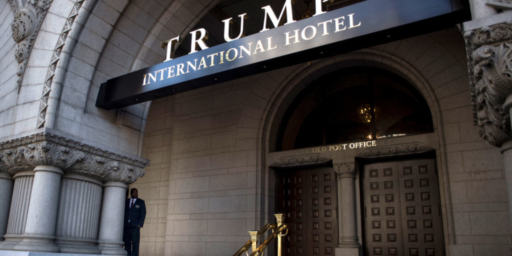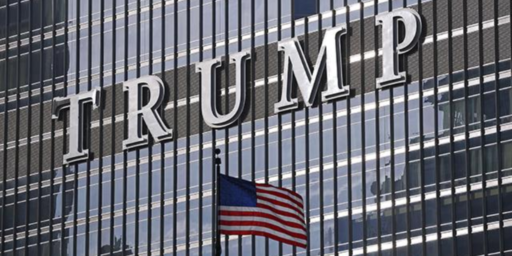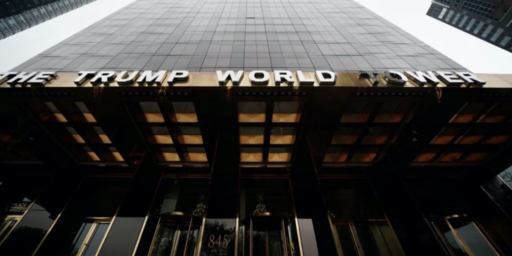Judge Allows Emoluments Clause Case Against Trump To Go Forward
A Federal Judge is allowing a lawsuit alleging that President Trump is improperly benefiting from business being done at the hotel in Washington, D.C. bearing his name to go forward.
A Federal District Court Judge is allowing a case filed by Maryland and the District of Columbia alleging that President Trump is acting in violation of the Constitution’s Emoluments Clause to go forward, opening up the possibility of significant discovery regarding the President’s private business activity:
WASHINGTON — A lawsuit accusing President Trump of violating the Constitution by refusing to divorce himself from his businesses cleared a critical hurdle Wednesday when a federal judge in Maryland refused the Justice Department’s plea to dismiss it.
In a 47-page opinion, Judge Peter J. Messitte rejected the federal government’s claims that the plaintiffs had not shown that they had suffered injuries that a court could address.
The suit, filed by Washington, D.C., and the State of Maryland, accuses Mr. Trump of violating constitutional anticorruption clauses intended to limit his receipt of government-bestowed benefits, or emoluments. The local jurisdictions claim that in hopes of currying presidential favor, government officials are patronizing Trump-owned properties instead of hotels or convention centers that the District of Columbia or Maryland own or have some financial interest in.
Although the case could still be thrown out on other grounds, the judge’s ruling adds to the president’s growing legal troubles.
Besides the continuing criminal inquiry into Russia’s influence over the presidential election, an actress in pornographic films, a former Playboy model and a one-time contestant on “The Apprentice” have filed civil lawsuits over their alleged relationships with Mr. Trump before he became president.
The emoluments case raises basic questions that have never been litigated. Even the specific definition of an emolument is unclear. During a January court hearing, Judge Messitte seemed to acknowledge that the case would ultimately be decided by a higher court than his.
Although the president’s critics are hoping that the judge will allow the plaintiffs to scrutinize the Trump Organization’s financial records, perhaps even including the president’s tax returns, it was not clear from Wednesday’s opinion whether the judge would permit such discovery. The next stage of the case is expected to involve arguments about what constitutes an emolument.
Nonetheless, for the plaintiffs, the ruling that they have legal standing to challenge the president’s actions is an important first step in their quest to show that Mr. Trump crossed a constitutional line. “We look forward now to proceeding to address the constitutional issues and demonstrate that the emoluments clauses forbid the things of value that are flowing into the president’s pockets from governments foreign and domestic,” said Norman L. Eisen, the chairman of Citizens for Responsibility and Ethics in Washington, who is serving as a co-counsel in the case.
The judge limited the scope of the suit to the Trump International Hotel, down the street from the White House, and businesses related to it that are owned by the Trump Organization. The president’s other business interests — such as the Mar-a-Lago estate in Florida — are not at issue, he found, because they have no clear effect on the plaintiffs.
Judge Messitte rejected the Justice Department’s argument that it is up to Congress, not a court, to decide whether the president has violated the emoluments clauses. He noted that the domestic emoluments clause, which restricts economic benefits to the president from government entities in the United States, makes no mention of Congress. “Congress has nary a say about it,” he wrote.
While the constitution does state that Congress can allow the president to accept gifts from foreign governments, he wrote, that does not rule out a lawsuit claiming violations. “If that were so, the Supreme Court would not have decided other cases involving constitutional provisions containing similar consent-of-Congress provisions,” he wrote.
(…)
Lawyers for the Justice Department argued that there was no proof that Washington or Maryland properties were losing customers to Mr. Trump’s properties. Even if they are, they contended, that does not amount to a constitutional violation by the president.
But Judge Messitte found that the local governments “have alleged sufficient facts to show that the president’s ownership in the hotel has had and almost certainly will continue to have an unlawful effect on competition.”
He noted that some foreign government officials had stated publicly that they chose to patronize the Trump International Hotel because the president’s family owns it, and that some foreign governments had canceled reservations at other hotels and transferred their business to the president’s.
He also noted that the governor of Maine, Paul LePage, stayed at the Trump International Hotel last year shortly before he appeared at a news conference at which Mr. Trump signed an executive order that could affect a park and national monument in his state. That suggests that officials from Maryland and Washington might feel “obliged, i.e., coerced, to patronize the hotel in order to help them obtain federal favors,” the judge wrote.
The underlying claims against the President are based on two Constitutional provisions that, as far as any legal historian can tell, have never been litigated before in the entire 229 year period during which the Constitution has been in effect. The first provision, which has been called the “Foreign Emoluments Clause” is found in Article I, Section Nine, Clause 8 of the Constitution and prohibits any Federal official from receiving without Congressional consent “any present, Emolument, Office, or Title, of any kind whatever, from any King, Prince or foreign State.” The second clause, which has been called the “Domestic Emoluments Clause” can be found in Article II, Section 1, Clause 7 and states that the President “shall not receive within that Period any other Emolument from the United States or any of them.” Generally speaking, an “emolument” is defined as ” the returns arising from office or employment usually in the form of compensation or perquisites.” As noted, there is no record that these clauses of the Constitution have been raised or litigated with respect to any President since George Washington first took the Oath of Office in 1789 and no record of any legal proceeding in which a court of record has ruled on the application of these clauses in any specific case. Despite this fact, there is a long history of Presidents of the United States receiving gifts, including gifts that potentially have significant value, from foreign leaders and foreign nations. Typically, these gifts are given as part of official visits by foreign heads of government or heads of state to the United States, or official visits of the President to foreign nations during his time in office. Under a strict reading of the Foreign Emoluments Clause, these gifts would appear to be barred, but rather than being prosecuted for accepting them previous Presidents have been permitted to receive them as long as they are properly reported by the White House. At the very least, though, this history raise legitimate questions about what the clauses mean and whether they are being violated in this case.
As noted above, the Judge’s opinion did not deal with the merits of the claims made by Maryland and Washington, D.C. but instead with the question of whether or not they even had the standing to bring the claims they are asserting. In December, a Federal District Court Judge in New York had ruled that individual Plaintiffs lacked the standing to bring a claim against the President in large part because they had failed to allege the kind of a particularized harm generally required of Plaintiffs in Federal Court. In doing so, the Judge presiding over that case based his ruling on an incredibly narrow reading of the Emoluments Clauses that made it unclear if anyone could ever have standing to bring a claim against a sitting President or other government officials. In this case, Judge Missette, who was appointed to the District Court by President Clinton in 1993 and took Senior Status on the Court in 2008, appears to have interpreted the two clauses somewhat more broadly than his counterpart in New York City. Additionally, the fact that the Plaintiffs here are government entities that can potentially benefit, or be harmed, by the policies the President adopts, seems to have played a role in his decision. It’s also important to note that the Judge ruled that the Plaintiff’s claims can only be applied against the business conducted by the Trump International Hotel in Washington, D.C., which opened shortly before the President took office at the location that used to be the site of the old District of Columbia Post Office and which has status as a historic building in the city.
In any case, what this means is that the case can now move forward toward what would eventually be a trial on the merits. In the short term, this means that the Plaintiffs will be permitted to conduct discovery regarding the issues in the case, specifically including questions, document requests, and depositions regarding the revenues and business operations of Trump’s Washington, D.C. hotel. Potentially, this could include significant discovery related to the President’s personal finances and records pertaining to the question of how involved he may still be in the daily operations of The Trump Organization and its numerous and various subsidiaries. Ordinarily, this information obtained in discovery is not made publicly available and it’s possible that Trump’s attorneys, as well as the attorneys for the Federal Government, could ask the Judge to rule that the material obtained in discovery must remain confidential unless it ends up being used in the trial. With or without such an order, though, it’s probable that at least some of this information could become public in any case.
On a final note, it’s worth noting that this is not the only lawsuit dealing with the Emoluments Clauses currently pending in the Federal Courts. Just days after Maryland and the District of Columbia filed their lawsuit, nearly 200 Democratic Senators and Congressmen filed a similar lawsuit in the U.S. District Court in the District of Columbia. There hasn’t been any action of note in this case, but one presumes that it is at a similar stage to the Maryland case and that the Judge handling the case is likely considering a similar Motion to Dismiss. Whether the ruling out of Maryland has any impact on the direction that case takes will be interesting to watch.
Here’s the Opinion in Maryland et al v. Trump:
District of Columbia Et Al v. Trump Opinion by Doug Mataconis on Scribd






The goose is by no means cooked, but the oven is being preheated.
It has seemed obvious to me since Trump was elected that, absent a massive divestiture, these issues would arise. My main concern was that no one would have standing to sue but it seems this judge has bought off on a rather thin claim here.
You’re right that there’s no precedent. But no previous president has had anything like Trump’s business conflicts. Jimmy Carter famously put his peanut farm into a blind trust and most other modern presidents have been career politicians.
I don’t see how Trump supporters can countenance these huge (huuuuge) conflicts of interest after, correctly in my view, pointing to the conflicts posed by the Clinton Foundation.
@James Joyner:
Tribal partisanship was best illustrated by George Orwell in “Animal Farm.” Translated to today, the sheep (ie Trump’s base) only need to know “Trump good, Clinton baaaad.”
@James Joyner: Pure blind partisan hypocrisy.
@James Joyner: I didn’t give much thought to the Trump Hotel in DC, but shuddered at the prospect of positioning troops at Trump resorts around the world during periods of unrest.
No wonder Dennison has been in hiding all week…he is getting rocked.
Rightly so.
You reap what you sow.
Doug, this is a Stormy thing, but you have to read it. It’s hilarious.
(How did these two idiots ever pass the bar exam? It’s Orly Taitz level of losing to an empty chair.)
@grumpy realist:
I suppose either the bar exam isn’t as hard as it’s made out to be, or even an incompetent would-be fixer knows to pay someone else to take the exam for him.
@grumpy realist:
That was thigh-slappingly, bring-tears-to-your-eyes funny.
Cohen will be lucky if all that happens to him is he gets disbarred.
@grumpy realist: trump absolutely deserves this level of legal representation. Maybe there is a god after all.
@James Joyner:
I think most easily hand wave it away with the rational that “no one cared about the Clinton Foundation issues, so why do I need to care about Trump’s conflicts of interest.”
@mattbernius:
No, actually, they dismiss this as “fake news” because it’s reported in the New York Times. Excuse me. That should be “the failing New York Times.” Trumpkins only trust The Gateway Pundit, Infowars, The Conservative Treehouse, American Thinker, sometimes Fox, and a host of lesser hysterical crackpot blogs written by paranoid semi-literates to provide them with real news.
@grumpy realist: That is amusing. It is worth quoting this
but this does seem rather like the level of competence one would expect from a thuggish little real estate speculator’s operation.
@grumpy realist: Cohen is a bagman, not an attorney.